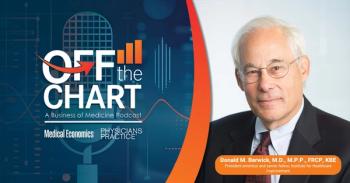
The Greatest Challenge Facing Physicians in 2013
This is a year of transition to primary implementation of the ACA, and it started with a showdown.
The challenge to physicians for this upcoming year is unprecedented because of the nexus of two major events: transition to primary implementation of the Affordable Care Act (ACA) and the last minute patchwork deal to avert the immediate effects of a massive tax increase, but not mandated spending cuts or debt.
While the transition to the ACA is a process subject to change, and it already has with the repeal of the
This year’s dominant challenge to physicians is to prepare for the unpredictable. The most important event to physicians, a 27 percent reduction in Medicare reimbursements, was avoided at the last minute, but at the expense of ripping billions in resources from hospitals, ancillary care, and dialysis clinics. To think that physician’s time for reductions over and above those mandated in the ACA will not come, and soon, is foolhardy. Simple common sense dictates that if they will do it to them (other providers), they will do it to you.
If you are thinking that the negotiations between the House of Representatives and President Obama are political posturing and ideological intransigence, think again. Both sides are so deeply invested in their belief that their position is best for the country, so continued gridlock is the most likely outcome and compromises will be measured in the degree of negatives.
The likely construct of a compromise on added revenues, spending, and debt should be keeping the entire healthcare industry up at night for many reasons, but these are my top three for physicians:
1. The health insurance income tax exemption is the biggest pot of money available at $150 billion a year, and it is seductive. The theory is that taxing health insurance benefits will force insurance costs down and slow spending. Costs will drop because deductibles will increase; hitting families even harder because eliminating the deduction will tear another $1,500 per year out of the average middle class family budget while increasing the upfront burden for care by as much or more. Add a projected 30 percent to 40 percent increase in premiums to pay for eliminating pre-existing conditions and other mandated benefits in the ACA and even a compromise limiting the new taxes will further boost the millions already foregoing care. Prepare for declining patient volume.
2. Spending reductions don’t have to be rate reductions: Escalating challenges for medical necessity from CMS have been the norm for hospitals and ancillary providers. If your technology is not up to the task, you may be in trouble. Prepare for reduced income, costs, and increased headaches.
3. Employers are dropping company-provided health insurance in numbers far in excess of projections, fueled by prospectively large premium increases. There will likely be lapses in coverage affecting tens of millions of people. Even with Health Insurance Exchanges starting early, the uncertainty of what level of benefits will be affordable could further inflate deductibles. Whether the states or the federal government runs them is essentially irrelevant since HHS approves the plans, compliance and makes the rules. Prepare for more “self insured” and “direct pay” patients.
To prepare:
• Cut every expense that does not produce revenue, save money, and/or strengthen your private/public payer mix. Invest in those that do, particularly care coordination and patient communication technology;
• Evaluate every operational process to gain efficiency and improve quality;
• Establish and post cash pricing;
• Set clear and measurable employee performance expectations, communicate them, and dispassionately evaluate every employee, retraining or replacing them if they don’t pass muster.
• Match the right skills to the right job;
• Evaluate every vendor and professional advisor (accountant, lawyer, etc.) and, if they aren’t a significant asset, replace them with experienced professionals who understand your business and provide an acceptable return. Learn value versus cost; and,
• Drop by with a catered lunch to your best referral sources at least quarterly.
Now is about three months too late, but better late than never.
Newsletter
Optimize your practice with the Physicians Practice newsletter, offering management pearls, leadership tips, and business strategies tailored for practice administrators and physicians of any specialty.






